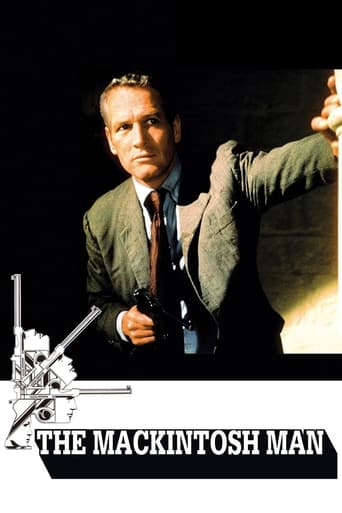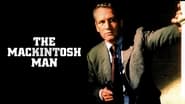MrOllie
Firstly, I apologise to fans of Maurice Jarre but I thought the soundtrack to this film was dreadful. There where some scenes in the film which I found to be so annoying purely because very loud zither music was blasting out. In one scene Paul Newman is looking out of a window onto Irish moorland with music reminiscent of The Third Man or Zorba The Greek deafening our eardrums. I thought quieter more sombre music would have been appropriate so as to create tension and atmosphere, but certainly not a zither. This could have been brought in when we are transported to Malta. Anyway, apart from the music I found it an okay film as Paul Newman's character Reardon is hired by MacKintosh a British Intelligence boss (Harry Andrews) to locate a gang who are helping prisoners to escape from jail. Reardon gets himself sent to prison and eventually escapes via the gang he has been hired to find. Paul Newman has a go at a Australian accent in this movie but it doesn't last very long. Overall, although I found this film lacking in suspense it does have some action and there are far worse ways to spend an evening than watching this.
Dave from Ottawa
Desmond Bagley's tightly plotted thriller about a man who escapes from prison with the help of a gang and then finds himself on their wrong side is loosely adapted here and not very well. The idea is a clever one and makes for an excellent suspense thriller in print; in any good thriller, the character is cut off from aid and isolated in the middle of a dangerous situation, and making the central character a fugitive in the company of thugs who mistrust him does this very well. Unfortunately, much of the tension-filled atmosphere of the book is lost here as the story becomes a murky riddle built around a not-very-interesting main character. Newman effectively conveys that he is clearly more than he seems, but the movie has trouble turning that into viewer interest. The grim drizzly look of the movie is its best feature, but even that seems coincidental and not organically connected to the storytelling. There were worse movies made that year, but better ones too.
ShadeGrenade
Despite having authored a string of bestselling thriller novels in the '60's and '70's, Desmond Bagley never enjoyed anything like the fame of his nearest rival, Alistair Maclean. In my view he was the superior writer; check out 'Landslide', 'Juggernaut' and 'Running Blind' if you do not believe me. Whereas Maclean got superlative movies fashioned from 'The Guns Of Navarone', 'Ice Station Zebra', and 'Where Eagles Dare', Bagley's stories were, by and large, ignored by Hollywood. A rare exception was John Huston's 1973 film of 'The Freedom Trap', retitled 'The Mackintosh Man'. Paul Newman plays 'Joseph Rearden', recruited by British Intelligence boss 'Mackintosh' ( Harry Andrews ) for a top secret operation to unmask a traitor at the heart of the establishment. Posing as an Australian jewel thief, he allows himself to be sent to jail for twenty years ( how times change. Nobody would get a sentence like that now even for murder ). A fellow inmate ( Nigel Patrick ) informs him of the existence of 'The Scarperers' - a group who help rich prisoners escape for a large fee. Rearden goes over the wall with Communist spy 'Ronald Slade' ( Ian Bannen ). Some time later, he wakes up in a mysterious country house with sinister German nurse 'Gerda' ( Jenny Runacre ) and creepy 'Mr.Brown' ( Michael Hordern ) for company. But his cover is blown, and he is forced to make a break for it. A phone call to London informs him that Mackintosh - the one man who knows of his innocence - has died...Loosely based on the real-life case of George Blake - a Communist spy who was freed from jail in 1966 by men sympathetic to his cause - this pleasant, old-school spy thriller benefits from a twisty story, location shooting in London, Ireland and Malta, and a first-rate cast. Newman is as solid as ever, and alongside him are some great British stars such as James Mason, Roland Culver, Percy Herbert, and Peter Vaughan, with lovely Dominique Sanda as Mackintosh's daughter 'Mrs.Smith'. Stealing the show, however, is the stunning Jenny Runacre as 'Gerda', who gets to inflict some painful-looking wounds on the star. Wonderful Irish actors like Noel Purcell and Eddie Byrne appear fleetingly. Maurice Jarre's title theme is very much in the same vein as Anton Karras' music for 'The Third Man'.Walter Hill, who wrote the script, later became a major action director with '48 Hours' and 'The Driver' to his credit. He sticks to the book but the ending has been unfortunately changed. Instead of 'Sir George Wheeler's' ( Mason ) yacht being blown up by a limpet mine, we get a more low-key climax similar to that of 'The Ipcress File'. It ends far too quickly for my liking. Rearden deserved better than to be dumped by Smith. I'd also like to know how an old lorry could possibly outstrip a powerful Mercedes on a quiet Irish road. Flaws aside, 'The Mackintosh Man' is an above average time-passer.
zardoz-13
Paul Newman stars as a veteran undercover British Intelligence operative on the lam in "Maltese Falcon" director John Huston's "The MacKintosh Man," based on Desmond Bagley's novel, a superficial but entertaining espionage thriller that takes part in London, Ireland, and the island of Malta. Mind you, this isn't Huston's best film and it's a far cry from "The Maltese Falcon," "The Asphalt Jungle," and "Key Largo." Nevertheless, a solid cast, atmospheric settings, and composer Maurice Jarre's "Third Man" type zither tune enliven this somewhat indifferent 1973 Warner Brothers release. Previously, Newman and Huston had collaborated on "The Life and Times of Judge Roy Bean," another less-than-stellar Huston effort. Indeed, Huston was between hits during his sabbatical with Newman. The 1972 movie "Fat City" garnered him some critical acclaim, but Huston did not flower again until his next film, the Sean Connery & Michael Caine period adventure "The Man Who Would Be King," that he had planned to make originally with Clark Gable and Humphrey Bogart. Meanwhile, Huston populated "The MacKintosh Man" with a memorable cast, including the urbane but villainous James Mason as Sir George Wheeler, Ian Bannen as the Communist traitor Ronald Slade, Harry Andrews as Angus MacKintosh, Peter Vaughan as a London detective, and the statuesque French beauty Dominique Sanda.Angus MacKintosh (Harry Andrews of "633 Squadron") summons secret agent James Reardon (Paul Newman of "Hombre") to London to help him expose a traitor at the highest level. MacKintosh has furnished Reardon with a background as a criminal from Australia. Mrs. Smith (Dominique Sanda of "The Conformist") arranges for Reardon to have access to a bank account in Switzerland while MacKintosh explains that London used to rely on couriers to deliver diamonds. Greed and corruption spelled the demise of the system and diamond merchants now send diamonds through the mail in inconspicuous packages that nobody could imagine contained hundreds of thousands of diamonds. They arrange matters so that Reardon assaults a British postman and steals a diamond package valued at 140 pounds. Inspector Brunskill (Peter Vaughan of "Brazil") catches Reardon packing in his motel room before he can exit the United Kingdom. Of course, Reardon slipped Mrs. Smith the diamond package soon after he stole it from the postman. Brunskill arrests Reardon, and the trial judge (Roland Culver of "Thunderball") sentences our hero to a twenty year stretch in Chelmsford Prison.While he serves time in Chelmsford, Reardon spots Communist traitor Ronald Slade (Ian Bannen of "The Inglorious Bastards"), but he never gets an opportunity to meet him. Meanwhile, another prisoner soon to be released, Soames-Trevelyan (Nigel Patrick of "The Battle of Britain") introduces himself to Reardon and explains that he acts as an intermediary for a group that will rescue inmates from the slammer in return for a steep monetary payment. Reardon obtains the money and learns that a crack team will rescue both Slade and him from prison. The escape occurs while the prisoners are in the exercise yard, and one smoke grenade after another flies over the prison wall and lands in the exercise yard, obscuring everybody and everything. Unbeknownst to the prison authorities, a truck with a crane drops a naval net over the side, and Slade and Reardon both scramble onto it. The crane hoists them over the wall, and they clamber astride and behind guys on motorcycles. Slade and Reardon are not far from the prison when they enter another truck and drive away. The two are given a hypodermic injection to put them to sleep. When Reardon and Slade recover they find themselves comfortably encounced in an isolated mansion. Meanwhile, MacKintosh closes the noose around Sir Charles Wheeler's neck and gives him the opportunity to resign. The two men have known each other since they worked in British Intelligence during World War II. Mrs. Smith pulls in to pick up MacKintosh at the train station. After MacKintosh gets off the train, he is run down by a car and winds up in a coma in the hospital.At the secluded mansion, Mr. Brown (Michael Horden of "Where Eagles Dare") turns his henchmen loose on Reardon once he learns his true identity, and they beat him up. Reardon recovers from the beating and sets a trap for them and then escapes after setting his bed ablaze. The villains pursue him across the moors while the mansion burns and Reardon discovers that he is in Ireland. He finds himself in a remote village and rents a small truck to pick up Mrs. Smith after she flies in. At the same time, Sir Charles arrives on his yacht. He has smuggled Slade on board and is heading for Malta. Reardon and Smith follow him to Malta. Mrs. Smith goes aboard Sir Charles' yacht while Reardon approaches the Maltese authorities about the politician hiding the prisoner escapee aboard his yacht. The authorities board Sir Charles yacht and predictably find nothing. MacKintosh realizes that he is in trouble and dives off the yacht, escaping from the police. After the authorities leave, Reardon climbs back aboard the yacht and learns about Sir Charles' whereabouts at a church at Marsaxlokk. Sir Charles has taken Mrs. Smith there along with Slade. Reardon shows up armed and Sir Charles learns that MacKintosh has not only died but also the Prime Minister knows about his treachery. Wheeler and Slade try to make a deal with Reardon, but the vengeful Mrs. Smith—MacKintosh was her father—guns them down repeatedly."The MacKintosh Man" puts Newman behind the eight ball early, but he is rarely in jeopardy. The prison break is cool and future director Walter Hill's dialogue is flavorful, but John Huston has done better work. Suspense is virtually nonexistent. There is a fast chase, but it is never harrowing. Sanda and Newman have an intimate moment in the sack before he pulls the diamond robbery, but their romantic liaison occurs off-camera. Everything about "The MacKintosh Man" is lackluster.






